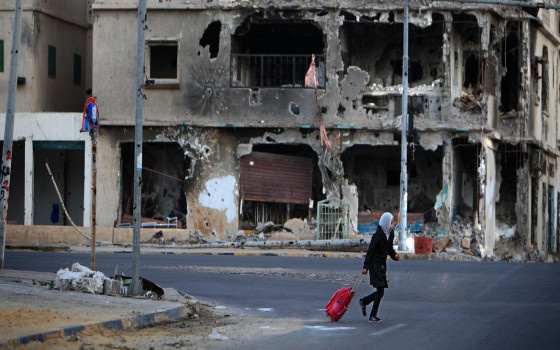
The Syrian people are suffering from poverty.. The United Nations: Accelerating economic recovery is the way to restore stability

- Europe and Arabs
- Friday , 21 February 2025 8:55 AM GMT
Damascus - New York: Europe and the Arabs
The United Nations Development Program said that nine out of ten people in Syria live in poverty and one in four is unemployed, but the country's economy could regain its pre-conflict level within a decade, amid strong growth. According to the UN daily news bulletin, a copy of which we received on Friday morning, and added, "This came in a new report issued by the program yesterday, Thursday, entitled "The Impact of the Conflict in Syria: A Devastated Economy, Endemic Poverty, and a Difficult Road Forward to Social and Economic Recovery." The UN program said that 14 years of conflict in Syria have spoiled nearly four decades of economic and social progress and human capital. The report warned that according to current growth rates, the Syrian economy will not regain its pre-conflict level of GDP before 2080, explaining that annual economic growth must increase sixfold to shorten the recovery period to ten years, and an ambitious increase of ten times over 15 years will be needed to return the economy to what it should have been without the conflict. The report stated that the country's GDP has fallen to less than half its value since the conflict began in 2011, and unemployment has tripled. One in four Syrians is now unemployed, and the deterioration of public infrastructure has greatly multiplied the impact of the conflict. The Director of the UN Program said UNDP’s Achim Steiner said that beyond immediate humanitarian assistance, Syria’s recovery requires long-term investment in development to build economic and social stability for its people.
“Restoring productivity to create jobs and alleviate poverty, revitalizing agriculture to achieve food security, and rebuilding infrastructure for basic services such as health, education and energy are all essential to achieving a sustainable future, prosperity and peace,” he added.
Significant losses
The report detailed the impacts of the conflict, including:
An estimated loss in GDP of US$800 billion over 14 years.
Three out of four people rely on humanitarian assistance and need development support in the essential areas of health, education, income poverty, unemployment, food insecurity, water, sanitation, energy and housing.
The poverty rate has nearly tripled from 33 per cent before the conflict to 90 per cent today.
Extreme poverty has increased six-fold, from 11 per cent to 66 per cent.
Between 40 and 50 per cent of children aged 6 to 15 are out of school.
Nearly a third of housing units have been destroyed or severely damaged during the years of conflict, leaving 5.7 million people in Syria in need of shelter support today.
More than half of water treatment plants and sewage systems have been damaged or rendered inoperable, leaving nearly 14 million people – half the population – without clean water, sanitation and hygiene.
Energy production has fallen by 80 per cent, with more than 70 per cent of power plants and transmission lines damaged, reducing the capacity of the national grid by more than three-quarters.
The report said Syria’s Human Development Index – a measure of development developed by the United Nations Development Programme that combines health, education and income indicators – has fallen from 0.661 in 2010 to 0.557. This is lower than the first Human Development Index in Syria recorded in 1990.
The conflict has killed nearly 618,000 people and displaced 113,000, and many lives may have been lost due to the collapse of the health system, with a third of health centers damaged and nearly half of ambulance services disrupted, according to the program’s report.
A strong approach to recovery
Syria’s future depends on a strong approach to development recovery, said Abdullah Al-Dardari, Assistant Administrator of the United Nations Development Program and Director of the Regional Bureau for Arab States, noting that this requires a comprehensive strategy that addresses governance reform, economic stability and infrastructure reconstruction.
He added: “By implementing these interconnected reforms, we can help Syria regain control of its future, reduce dependence on external aid, and pave the way for a resilient and prosperous future for all in Syria.”
In a press conference at the United Nations headquarters in New York, Al-Dardari presented the findings of the new report.
He explained that reaching the levels of growth mentioned in the report requires economic investments worth $36 billion over ten years, excluding the housing sector, in addition to providing social protection, as 90 percent of the population lives in poverty.
He added that "it is very important to revitalize the productive sector in a country that was productive and self-sufficient in food and most consumer products."
He also stressed the need to look seriously at sanctions, noting that "as reforms progress, we need to make sure that sanctions are dealt with in a way that allows Syria to deal with those reforms and requirements."












No Comments Found